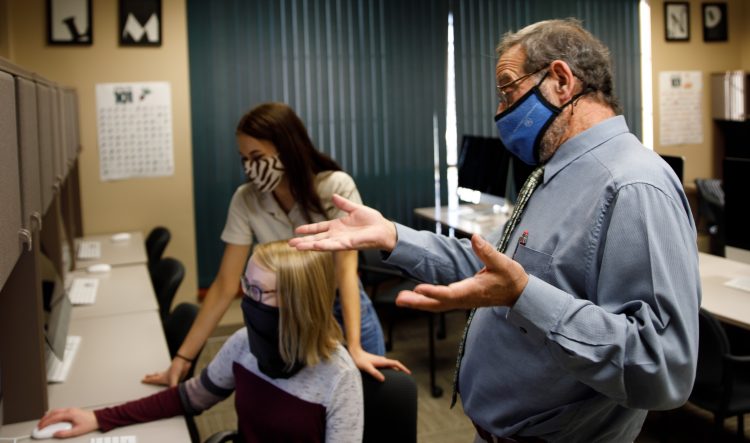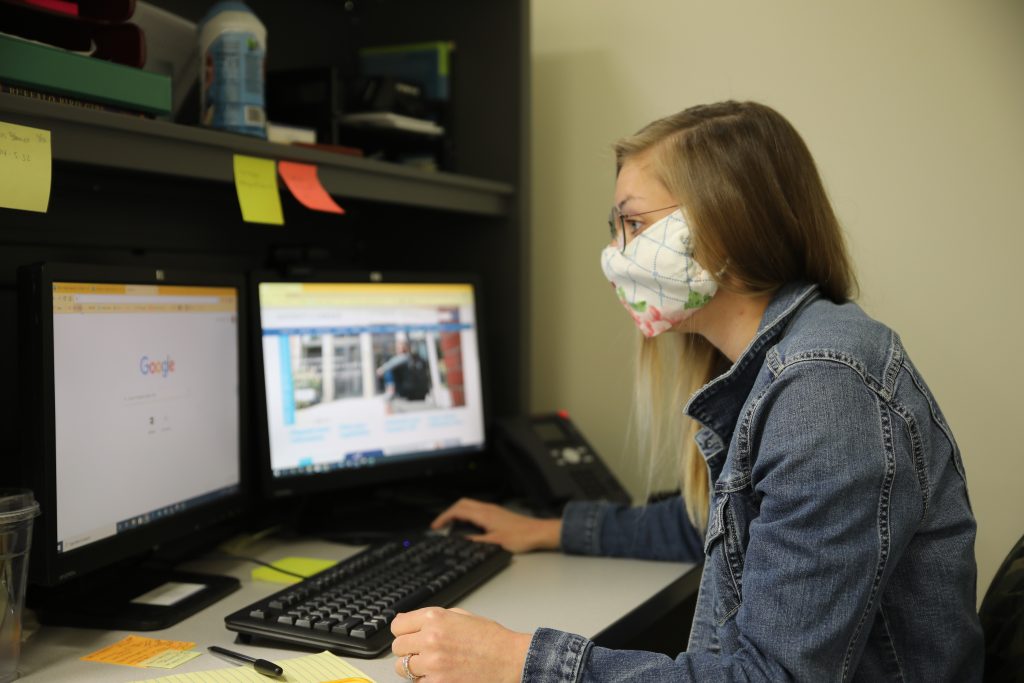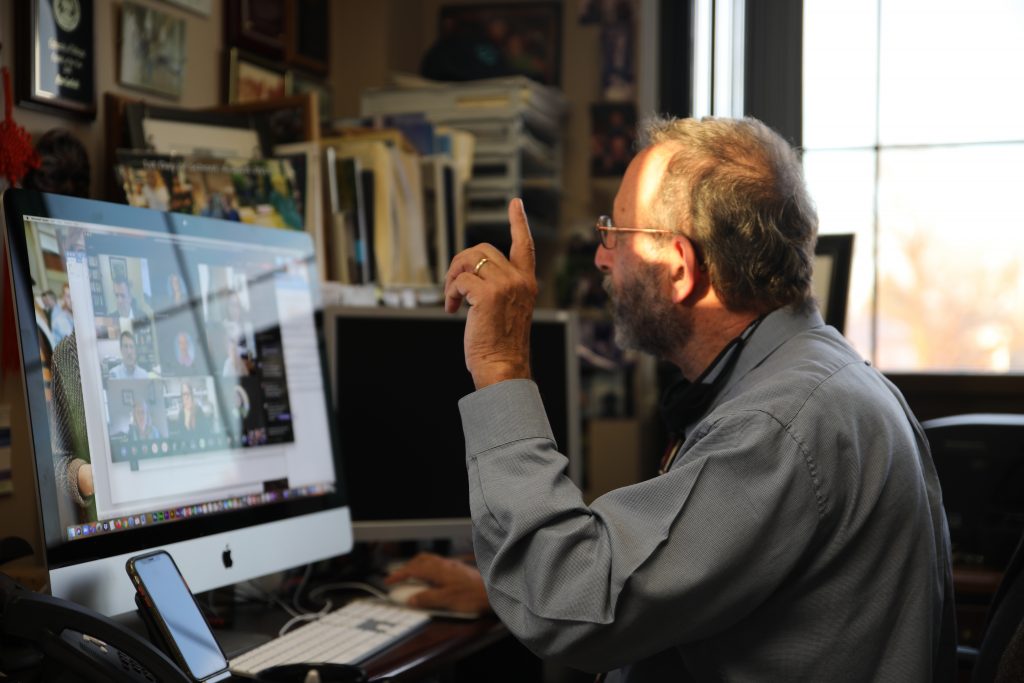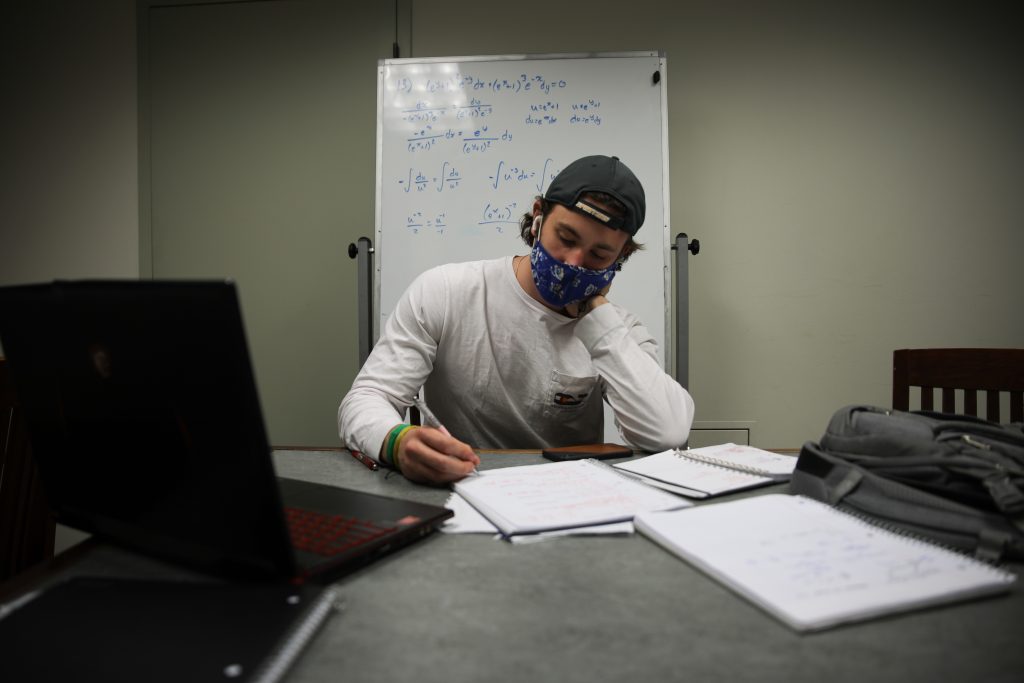Friday, March 13, 2020 was the day I last remember feeling normal. Along with our youngest son, my wife and I were returning home from a college visit in North Dakota. Winter was still with us in the Midwest, but hope for less snow and more warmth was in the air. And then the COVID-19 dominoes began to fall, one after the other: extend spring break by one week, spring intercollegiate athletics cancelled, move spring semester to on-line instruction, make a plan, make a new plan, scrap the old and the new plan and make another plan. As it relates to your own lives, most of you know of that which I am writing.
Admittedly, it has been difficult for me to “think” during this time. It’s not so much that I don’t have something to think about but that there are many other priorities, virtually all of them COVID-related. Nevertheless, I have learned a few very important lessons during these intervening 7 months. I will share them with you, and hope that you will respond with your own insights.
Simple is often best.
Good hygiene, that is, hand washing with both frequency and vigilance is probably the most important, least expensive, and easiest preemptive any of us can practice.
In other words, your parents had it right!
Live each day.
Prior to March 13, 2020, I’ve struggled with getting the most out of each day. I learned about the gift of each day in Sunday School. I tried to practice absorbing each day in theological seminary, and through daily spiritual disciplines. I instructed my children about getting the most out of every day, and living each day to the fullest. I’ve tried to take to heart the “smell the roses” advice that I’ve received from mentors over the years. And I am only now improving—taking my own advice—because of this pandemic.
Thank you, COVID-19.
Virtues: Adaptability, Patience and Forgiveness.
Everyone is on edge—everyone. I have witnessed, experienced and, regrettably, probably done, said, or thought things about other people, other countries, and other situations that are; well, inappropriate.
Adaptability is a life necessity.
Patience is a virtue.
And forgiveness—when given or received—is healthy for both the giver and receiver.
Thank you, COVID-19.
Humans require authentic relationships.
I don’t like social media. I realize that this statement is ironic, given that I am writing a blog. Thankfully, I have a colleague who manages my social media accounts. I don’t know my passwords, let alone how to access most of the platforms. I realize that I am antiquated. I still like to read books; most of my family reads from Kindle. I love watching the History Channel; our culture seems to be fixated on Zombies. There is little that is more enjoyable to me than sitting down with friends and colleagues—and just talking. Sharing stories about family. Reminiscing about former colleagues or students. Enjoying an athletic event, performance, and art show—together. I love authentic relationships, and these relationships have become somewhat conspicuous by their absence.
I purposefully came to my office every day from March 13 until the beginning of our new semester. Going to my office was a necessity—and a personal act of defiance. I still recall seeing another human getting their picture taken in front of our large “University of Dubuque” entrance sign in early June. I was so excited, that I actually ran them down to say “hello.” After a “hello,” I reached out to shake their hand, only to realize that I was violating social distancing norms by doing so. Thankfully, though surprised, they were exceedingly gracious!
COVID-19: thank you for reminding me that I really do love people.
People are every organizations most important asset.
When I started at UD twenty-five years ago, our endowment—the lifeblood of a University—was about $13 million; today it is approaching $200 million. In twenty-five years, we have built over 37 new buildings, and completed 7 different renovation projects. In 1998, we had about 600 undergraduate students; today there are over 2200. All of these achievements are wonderful, and something for which each one of us at UD is immensely grateful. But, as wonderful as these accomplishments are, the most important asset we have is our people. Not the endowment. Not the buildings. Not our programs.
Photo Credit: Noah Bullock
I absolutely love our people! I am grateful for their commitment to our Mission. I am grateful for their commitment to our students. I am grateful for their commitment to keep these buildings and grounds in Dubuque, Cedar Rapids, Tempe, Arizona and Meridian, Idaho “standing tall.” But, hands down, my proudest moment was when our faculty and staff communicated to our Dean that, despite what colleagues were doing at many colleges and universities across the country, they believed that we, at UD, had a moral responsibility to be in the classroom, cafeteria, health center, or athletic complex with our students. You heard me correctly—a moral responsibility to be physically present for our students.
We don’t talk much about moral commitments in our society today. Perhaps we should.
A moral commitment requires staking out a position in an expanding amoral culture. Asserting commitments, particularly moral commitments, makes some people uneasy. But in this instance, it was virtuous because it was focused on the other; our students. That is, there is a fundamental understanding by those in our classroom that their vocations call them to teach and learn, face-to-face, with our students from over 40 states and 25 countries. Incarnational formation—that’s what we do.
Thank you, COVID-19.
The pandemic will end, but our lives will not be normal again if what we mean by that term is something that resembles pre-March 13, 2020.
Thank you, COVID-19.














Very good.
Thank you for reading the blog, Matthew.
Jfb
Thanks Jeff for the uplifting message – Rich S
Rich,
Appreciate your reading the blog, and your good work.
Jfb
So interesting. Great news. I had no idea 37 new buildings. There were only 600 students back in 1970 when I attended. Surprised there were still only 600 in 1998! Thanks
Lora,
Thank you for reading the blog, and sharing your thoughts.
Jfb
Dr. Bullock,
Per usual, your blog is unusual. Within your reflections upon your life you always manage to precisely touch some facet of my own recent experience that I’d rather have let slip by, unnoticed. Some for shame; others for shock; this time for a longing, loneliness. After four (plus) of the longest years of my life, a call to ordained ministry that would encompass my own “love for people” continues to be just out of reach. When I read your tag-line (Thank you, COVID-19), a few tears formed; a sort of “call and response” filled my head.
It rehearsed a number of strange things that have touched my life with the trials of Novel Coronavirus. Perhaps oddest among them was this exchange: “But, haven’t you seen the blessing of the 90+ y/o woman whom you could no longer visit with pastoral care? In April, she let you spend two hours working just 10-feet apart from her to remove the overgrowth of ivy from her wooden fence.” I recalled how we shared a brief prayer before I returned home that day: a blessing of the ivy, tho’ not unlike Jesus’ cursing of the fig tree.
Thank you, COVID-19.
Carol,
I sincerely appreciate your taking the time to read the blog, and for sharing your insights and situation. There is a place for you in service to Jesus; everywhere!
God bless you.
Jfb
Once again Jeff you hit the nail on the head. The Covid arrived, is still present but will be contained soon by our drug and medical communities. Until that time we must adapt to the big changes it has brought to our lives.
My wife and I have been returning to UD for Homecoming for many years now and are just amazed what alumnus, students, your staff and you have done since those rather dire years of the late twentieth century. We say to all a BIG THANK YOU for saving UD and growing it into one of the premier colleges in the Midwest.
Stay well and safe everyone.
Jerry,
Thank you for reading the blog, and for sharing your thoughts.
We are—ALL—very fortunate. This whole Transformation has been a we thing—trustees, faculty, staff, alums, and friends. And our students and Mission are what make it all worthwhile!
Jfb
Patience and forgiveness. Those are the two virtues that have been front of mind for a majority of this year. You are correct in saying that folks everywhere are stressed, lashing out, and trying to find their way in this new era. It certainly hasn’t been easy adapting. Coming to terms in a sincere and honest way with this serious situation that faces our world is of dire importance.
Selflessness must also be at the forefront of our minds as we learn how to take care of each other and put our own comfort, convenience and pride aside to make sure our neighbors and peers are safe.
Thank you, Dr. B.
P.s. Noah did a good job with the phots. I especially like the one of Garf.
Michael,
Thanks for sharing your thoughts, and for reading the blog in the first place. I’ll pass on your kudos to the photographer!!
Jfb
The fall that the Great Depression hit, my father sold his entire crop of tobacco and got back $1, not much even back then. He was starting high school, and that was supposed to pay for clothes and other expenses. He said, “It would have been bad, except everyone else was in the same situation.” After high school, he worked in a mill to save money to pay for an operation for his hernia, a birth defect common to the male line of our family. As soon as he was healed, he joined the Army. That was 1937, and he didn’t get out until 1945 when WWII concluded. But in the military, he learned to work on airplanes, and he got a job soon after with a startup airline, Piedmont Airlines, where he worked for 33 years. Dad’s life was not “normal again” after the war, but that was just fine with him.
Such were the stories I grew up with. And those stories help me keep things in better perspective. I don’t want to minimize risk—I teach about it in my classes–but neither do I want to lose the human connections that make me glad to be at UD. So far, I think we’ve done a good job, and if wearing masks allows me to see their smiling eyes, then I’m not going to complain.
Dale,
Thank you for sharing your insights! Very, very interesting!
And thanks for reading the blog!
jfb
Dale’s story above prods me to tell a bit of my family history. My maternal grandfather lost his first wife to the Spanish Influenza Epidemic of 1918. Before supermarkets and refrigeration families in the cities went to the local grocer daily or at least every other day. While my grandfather was at work with his 12 year old son, my 7 year old aunt took her 4 year old brother to the grocer with a list of items needed for dinner, while the four month old girl was at home with mom. Upon their return, my aunt discovered the hanging body of their mother. The death certificate blames the flu as the secondary cause of death, but it is unclear as to weather my grandmother took her life due to the hysteria caused by her fever or the fever of hysteria running rampant in Ohio that October. My grandfather was forced to ship his four children out to four different families until he could financially and emotionally get back on his feet. The result was he only reconnected with one child once he remarried seven years later. He never saw the other three kids until they were adults. The four month old baby (unknowingly) was taken immediately back to Finland and not seen again until she was 55 years old.
To Jeff’s ask, with this kind of tie to the last pandemic to hit America, I have no issue with wearing a mask or with social distancing. The 1918-1919 pandemic was only stopped by the use of masks and physically quarantining (by boarding-up and signage) of houses containing any individuals afflicted with the virus.
Bill,
Thank you so much for sharing this very personal story. The depth of suffering that people endure–often silently.
jfb
Hi Dr. Bullock, I’d add: Take a walk! When the stress mounts, I take the dog around the lake. You probably have the daily luxury of some walks on the beautiful campus, if you can fit them in. Walks help me a lot! Gives me time to admire God’s creation and moments to pray. Keep up the good work! 😉
Great advice!!
jfb
President Bullock, you cant even encourage the wearing of masks in a blog devoted to the subject of surviving the covid pandemic? Maybe I missed it but if you wash your hands I would have thought you would say wear a mask.
Thank you for your comments, Roger,
Actually, the UD Mantra is: “Practice Common Sense–good hygiene, social distancing, and wear a face covering for yourself and for others.”
Thanks for the opportunity to clarify–and add!!
jfb